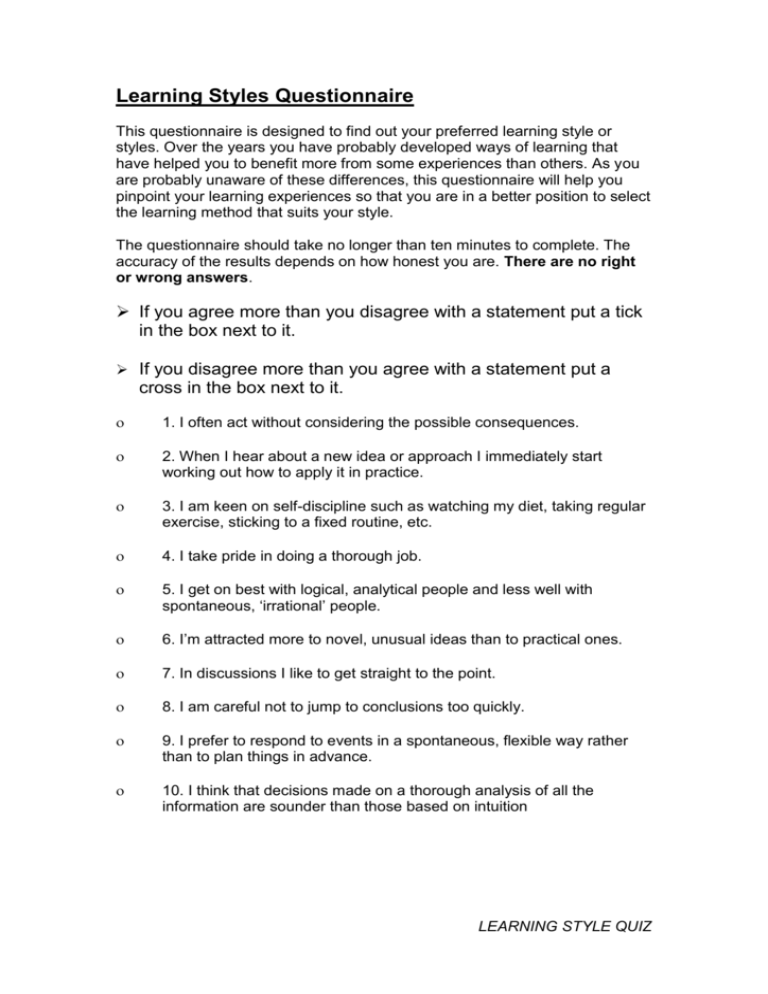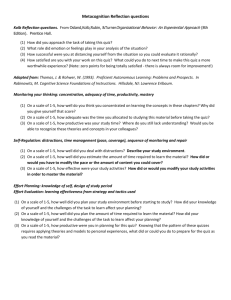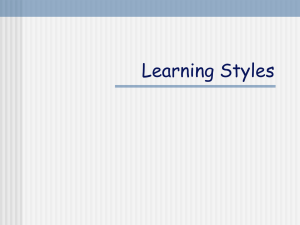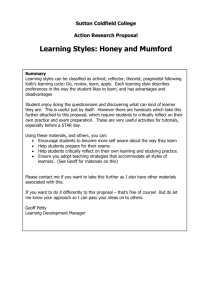Learning Styles Questionnaire - Are you looking for one of those
advertisement

Learning Styles Questionnaire This questionnaire is designed to find out your preferred learning style or styles. Over the years you have probably developed ways of learning that have helped you to benefit more from some experiences than others. As you are probably unaware of these differences, this questionnaire will help you pinpoint your learning experiences so that you are in a better position to select the learning method that suits your style. The questionnaire should take no longer than ten minutes to complete. The accuracy of the results depends on how honest you are. There are no right or wrong answers. If you agree more than you disagree with a statement put a tick in the box next to it. If you disagree more than you agree with a statement put a cross in the box next to it. 1. I often act without considering the possible consequences. 2. When I hear about a new idea or approach I immediately start working out how to apply it in practice. 3. I am keen on self-discipline such as watching my diet, taking regular exercise, sticking to a fixed routine, etc. 4. I take pride in doing a thorough job. 5. I get on best with logical, analytical people and less well with spontaneous, ‘irrational’ people. 6. I’m attracted more to novel, unusual ideas than to practical ones. 7. In discussions I like to get straight to the point. 8. I am careful not to jump to conclusions too quickly. 9. I prefer to respond to events in a spontaneous, flexible way rather than to plan things in advance. 10. I think that decisions made on a thorough analysis of all the information are sounder than those based on intuition LEARNING STYLE QUIZ 11. I tend to be a perfectionist. 12. More often than not, rules are there to be broken. 13. I can often see better, more practical ways to get things done. 14. If I have a report to write I tend to produce lots of drafts before settling on the final version. 15. In discussions I often find I am the realist, keeping people to the point and avoiding wild speculations. 16. In discussions with people I often find I am the most dispassionate and objective. 17. When things go wrong I am happy to shrug it off and ‘put it down to experience’. 18. It’s best to think carefully before taking action. 19. I don’t mind hurting people’s feelings so long as the job gets done. 20. I like meetings to be run on methodical lines. LEARNING STYLE QUIZ How To Work Out Your Score When you have completed the questionnaire you need to work out your score. You do this by using the accompanying score sheet which gives each question a coded letter – A, P, R, or T – to record your answers on. NB. For each of the questions that you have ticked enter one point against the corresponding letter. For example, if you put a tick against question number one record one point against code A. When you have finished add up all the points for each code. The one that has the greatest number of points is likely to be your preferred learning style. LEARNING STYLE QUIZ Scoresheet My Answers 1. A 2. P A ………………………………… 3. T Total points: 4. R R………………………………… 5. T Total points: 6. A P ………………………………. 7. P Total points: 8. R T ………………………………. 9. A Total points: 10. R 11. T Code with greatest number of points: 12. A 13. P Code with least number of points: 14. R 15. P 16. T 17. A 18. R 19. P 20. T LEARNING STYLE QUIZ Learning Styles There are many theories about learning styles. Kolb’s [1984] model is based on a cycle that includes active learning and passive learning. These provide both concrete and abstract experience. Kolb’s inventory identifies learners who prefer: active experimentation, people who would describe themselves as: ‘practical, doing, active, responsible’ reflective observation, people who would describe themselves as ‘tentative, watching, observing, reflecting, reserved’ abstract conceptualisation, people who would describe themselves as ‘analytical, thinking, evaluative, logical, rational’ concrete experience, people who would describe themselves as ‘receptive, feeling, accepting, intuitive, present-orientated’ Honey and Mumford [1985] based their learning cycle on Kolb’s work. They suggested the following learning styles: Activist, Reflector, Theorist and Pragmatist. ACTIVIST: ‘I’ll try anything once’. REFLECTOR: ‘I need time to think about it’ THEORIST: ‘If it’s logical it’s good’. PRAGMATIST: ‘If it works, it’s good’. Their learning cycle, extensively used today, is as follows: Taking action Planning for next time Seeing results Thinking about results Where you fit into this cycle, demonstrates your learning style. LEARNING STYLE QUIZ Learning Styles Activators or ‘do it now’ types get straight into the problem. If you are an activator then you fit into the ‘taking action’ part of the learning cycle. They enjoy challenges and can work quickly. They motivate others, prefer not to spend time planning and are good in a crisis. Reflectors or ‘do it later’ types like to approach problems cautiously, think them through and can delay starting. If you are a reflector then you fit into the ‘thinking about results’ area of the learning cycle. They have lots of ideas, are good listeners and get to the heart of the matter. Theorists or ‘do it by the book’ types need to know why they are doing something, they get everything organised before they start and are very logical in their approach. . If you are a theorist then you fit into the ‘planning for the next time’ part of the learning cycle. They tend to like everything just so, enjoy complex problems and question everything. Pragmatists or ‘do it from experience’ types need to relate the problem to their actions. If you are a pragmatist then you fit into the ‘seeing results’ part of the learning cycle. They need lots of information and can find it hard to select what is relevant, are highly motivated, see connections and are inventive. You may find that you have more than one learning style so you will need to adapt the style to the task in hand. This will encourage creativity and improve your learning. If you prefer to work alone do so, but keep in touch with your fellow students as they may need you. If you like to work in a group, meet up and decide who is doing what by when. Pooling resources is a very effective way of managing your time. What areas do you think each type of learner needs to develop? Activator: …………………………………………………………………………. Reflector: …………………………………………………………………………. Theorist: …………………………………………………………………………. Pragmatist: …………………………………………………………………………. LEARNING STYLE QUIZ SWOT analysis Consider your style of learning. To find out what sort of learner you are, compare your own descriptions of yourself to those suggested on the previous page. Do you recognize the outcome of the test? Copy out the SWOT chart below and begin by filling in your preferred style at the top of the sheet. Under each heading of strengths, weaknesses or challenges, opportunities and threats, make a note of examples that fit your learning style. One has been started for you to follow: Preferred learning style: activator strengths tend to lead group work challenges opportunities threats LEARNING STYLE QUIZ







